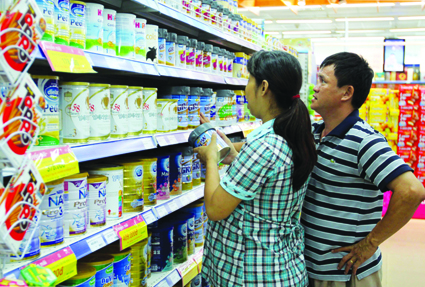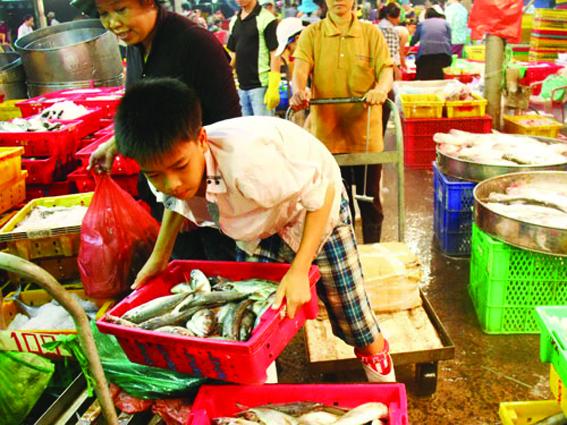A recently released draft decree on management of beer production and trading is receiving public criticism for its impracticality and unenforceability.
The decree was expected to reduce the harm of abuse of alcoholic drinks to protect public health and ensure social order and safety, a Ministry of Industry and Trade (MOIT) representative said. The law also aimed to limit overuse of beer as well as beer drinking at improper times and places and by improper persons.
The decree was drafted by the MOIT following Prime Minister Decision No. 244 issued in February this year to prevent and control the abuse of alcoholic drinks.

The draft, which is now open for public comment before being tabled to the Government later this year, details the management of beer production and trading, from investment, production, export, import and trading to other related activities. It also defines violations in this field, including trading in and consumption of smuggled beer, production and trading in counterfeit and imitated products, and use of beer production lines, equipment and technologies without lawful origins.
To prevent beer abuse, the draft bans beer sale at schools, hospitals and offices and on streets. It also prohibits beer selling to under-18 people, pregnant or breastfeeding women and persons with diseases related to abuse of alcoholic drinks. Sale of beer through automatic selling machines or online is also disallowed. Under the draft, all beer producers are required to obtain a beer production license and to stamp bottled beer before they are sold on the market.
A drafting team member stressed the law was necessary given the current overuse of beer which might harm people’s health and even cause social disorderA.
However, analysts and industry insiders were doubtful about the enforceability of the draft as it contained unreasonable and impractical provisions.
It was easy to find that the draft decree’s goal and management solutions were not connected, Nguyen Minh Thao, deputy director of the Business Environment and Competitiveness Department of the Central Institute for Economic Management, told the Tuoi Tre (Youth) daily. Management authorities had more powers under the decree, she pointed out, citing the required licensing for beer production and stamp labeling as adding the burden of the application-approval mechanism on the shoulders of businesses while the grounds for these requirements were unconvincing.
Thao cited law drafters’ explanation that beer production licensing and stamp labeling were needed as unplanned beer production would hurt investors as unconvincing because investors themselves would conduct market research carefully before making investment.
The solutions to reducing beer abuse under the decree were hardly feasible while immediately raising costs for businesses, she said.
Lawmakers’ reason for stamp labeling which was to fight smuggling was also unpersuasive. Many stamp-labeled products, including alcohol, cigarette and helmets, are among those being most smuggled and imitated as even the stamps themselves were counterfeit, Thao said.
Vu Xuan Dung, deputy general director of Habeco, the leading domestic beer producer, also agreed the stamp labeling would trigger huge costs for producers while it might form a market of fake stamps. He estimated with each stamp priced at VND 160-170, the stamp labeling would cost VND 1.6-1.7 trillion (roughly USD 76-81 million) each year, given the country’s current beer consumption of over 3 billion liters, equivalent to 10 billion product units, let alone imported beer, online service Vietnamnet reported.
With 4 billion product units marketed each year, Habeco would have to spend an additional VND 800 billion (USD 38 million) on the stamp labeling. This figure was even higher than the company’s marketing costs, Dung told Vietnamnet.
Nguyen Van Viet, President of Vietnam Beer-Alcohol-Beverage Association (VBA), also said the stamp labeling required for bottled beer was a waste since all required information was already printed on the beer bottle. Beer producers would have to pay additional costs for making and labeling stamps and cleaning labeled bottles, he said, stressing the responsibility to fight fake and smuggled goods rested with state management authorities rather than with businesses.
Viet also pointed to the impracticality and unenforceability of the ban on sale of beer to drunk people, pregnant or breastfeeding women and persons with diseases related to overuse of alcoholic drinks. How could a seller know a woman was pregnant or breastfeeding or a person was drunk or had an alcohol-related disease or was under 18, Viet said, believing these provisions would hardly be enforced but most likely give rise to abuse by inspection forces to trouble traders. He also showed doubts that there would be enough forces to sanction violators of these unreasonable provisions.
Once put into effect, a law must be implemented strictly with sufficient authorities to ensure its enforcement, analysts said, stressing otherwise the law would be ignored and the more serious consequence was people would disregard law and their confidence in the state management capacity would be reduced.
But Deputy Minister of Industry and Trade Ho Kim Hoa said the draft decree was only at the stage of public comment so controversial views were understandable, promising the ministry would seriously study comments and make appropriate adjustments before submitting the draft to the Government.
In fact, many impractical regulations were ignored after being introduced for their unenforceability, including street food safety requirements, smoking ban in public places, sanctioning of persons using hand phones in filling stations or dumping rubbish in public places, to name a few.- (VLLF)



